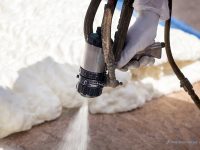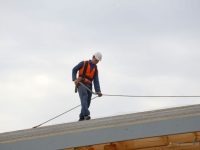Quality PVC Roofing
Polyvinyl chloride roofing, PVC roofing, is a membrane more commonly called, is a single-ply roofing solution that is used on flat or low slope commercial or industrial roofs. It is the third most popular choice, and the following PVC roofing benefits support why when roofing contractors are asked: “Is PVC roofing good?”:
- Flexible Membranes: PVC roofing is a flexible roof membrane that is prefabricated at the plant in PVC roofing sheets, minimizing the scraps and waste on a job site.
- Flame Resistance: These vinyl membranes used in PVC roofing are flame resistant and qualify for Class-A rating.
- Lightweight: PVC roofing membrane are lightweight, making them ideal for re-roofing commercial buildings. Easily installed over an existing roof membrane, saving money by not requiring tear-off of old roofing.
- Environmentally Friendly: PVC roofing maintains cooler temperature and reduces energy usage. PVC roofing and tolerates most chemicals and harsh environments longer than other roofing materials. PVC roofing material is eco-friendly, a number one reason why more building owners and contractors are choosing this material for flat roofs and low slope roofs. It is these benefits and features that contribute to the long lifespan you can expect from PVC roofing.
- Color Choices: PVC roofing comes in a variety of colors and patterns.
- Easy Installation:
- The technology used to create PVC roofing customizes to meet every building’s specifications.
How long does a PVC roof last?
A high-quality PVC roofing that is professionally installed can give you a twenty-year lifespan, great value for your money. To give you even more ROI, because of its durability, the need for costly maintenance and expensive repairs are eliminated as long as you keep the basic maintenance done. In the market of single-ply roofing, competitors of PVC roofing membranes could not match the remarkable advantages of this material because of the following benefits:
- Chemical resistant – Commercial buildings like a manufacturing facility, PVC roofing will withstand exposure to chemicals. In a commercial building with a restaurant, the animal fat grease from the roof vents won’t damage PVC roofing as it does an asphalt-based or other single-ply roofing.
- Durability – PVC roofing membrane seams are hot welded, making them more durable, moisture impermeable, and strong. Other roofing membranes are installed using adhesives, caulks, and tapes to seal the seams, making them less durable than PVC roofing.
- Strength – The engineering process for PVC roofing ensures a long lifespan by surpassing the standard measurements of 200 pounds per inch as established by the American Society of Testing and Materials. PVC roofing membranes’ strength is 350 pounds per inch.
Can you walk on PVC roofing?
You can, but it isn’t recommended. PVC roofing in cold weather becomes slick and dangerous on a flat or slightly sloped roof. Some have experienced with PVC roofing material and installed it upside down where the texture is different and not as slippery.
The building owner with PVC roofing should know this roofing material can be punctured. Any contractors working on the roof need to be aware to take caution and not drop nails, screws, or tools that can puncture the roof.
Is PVC better than TPO?
The first weldable sheet, PVC roofing reflectivity is similar to TPO, and when comparing PVC roofing vs TPO, both are flexible, and both are weather-resistant, with TPO having an edge over PVC due to the advances made with the product.
TPO remains to be the main and has the upper edge in weathering, PVC roofing is a worthwhile alternative. Professional roofers that have used switched to PVC would be surprised with the changes in the formulation of TPO the past few years that have improved it.
Now, TPO has excellent weathering that is better resistant to breaking and tearing compared to PVC. However, PVC has some traits that some customers prefer or need. For instance, when it comes to chemical resistance, PVC is the better choice. Grease and oil do not weaken PVC roofing as it does TPO, so when the structure houses a restaurant, PVC is the better option.
PVC roofing is more flexible than TPO, a bonus for contractors. Today, with the enhancements that TPO has now, both membranes are good welding material with the only difference is TPO has to have a higher temperature.
What is the difference between TPO and PVC roofing?
In the last few years, the flat roofing material market has seen TPO roofing gradually gained more space. TPO is like PVC roofing with benefits and installation but at a better price. The most substantial difference between PVC roofing and TPO roofing is the chemical makeup.
The intentions were for TPO to be the superior between the two, but to make it the least expensive, it lost some footing in quality and became substandard of the two. When everything is considered with material costs of both materials, PVC roofing and TPO roofing are about the same. TPO is favored and considered cheaper because contractors mark PVC pricing up more, although the labor is the same for both.
Whether you choose PVC roofing or TPO roofing for your flat roof commercial building, choose a contractor that understands your needs and appreciates your budget concerns. A professional roofing contractor should make this decision easier for you and answer your concerns and questions.




